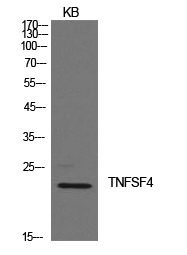Ox40L Polyclonal Antibody
- Catalog No.:YT5620
- Applications:WB;IHC;IF;ELISA
- Reactivity:Human;Rat;Mouse;
- Target:
- Ox40L
- Fields:
- >>Cytokine-cytokine receptor interaction
- Gene Name:
- TNFSF4
- Protein Name:
- Tumor necrosis factor ligand superfamily member 4
- Human Gene Id:
- 7292
- Human Swiss Prot No:
- P23510
- Mouse Gene Id:
- 22164
- Mouse Swiss Prot No:
- P43488
- Rat Gene Id:
- 89814
- Rat Swiss Prot No:
- Q9Z2P3
- Immunogen:
- The antiserum was produced against synthesized peptide derived from the Internal region of human TNFSF4. AA range:31-80
- Specificity:
- Ox40L Polyclonal Antibody detects endogenous levels of Ox40L protein.
- Formulation:
- Liquid in PBS containing 50% glycerol, 0.5% BSA and 0.02% sodium azide.
- Source:
- Polyclonal, Rabbit,IgG
- Dilution:
- WB 1:500 - 1:2000. IHC: 1:100-1:300. IF 1:100-1:300. ELISA: 1:10000. Not yet tested in other applications.
- Purification:
- The antibody was affinity-purified from rabbit antiserum by affinity-chromatography using epitope-specific immunogen.
- Concentration:
- 1 mg/ml
- Storage Stability:
- -15°C to -25°C/1 year(Do not lower than -25°C)
- Other Name:
- TNFSF4;TXGP1;Tumor necrosis factor ligand superfamily member 4;Glycoprotein Gp34;OX40 ligand;OX40L;TAX transcriptionally-activated glycoprotein 1;CD252
- Observed Band(KD):
- 21kD
- Background:
- This gene encodes a cytokine of the tumor necrosis factor (TNF) ligand family. The encoded protein functions in T cell antigen-presenting cell (APC) interactions and mediates adhesion of activated T cells to endothelial cells. Polymorphisms in this gene have been associated with Sjogren's syndrome and systemic lupus erythematosus. Alternative splicing results in multiple transcript variants. [provided by RefSeq, Jul 2014],
- Function:
- disease:Genetic variation in TNFSF4 influences susceptibility to systemic lupus erythematosus (SLE) [MIM:152700]. SLE is a chronic, inflammatory and often febrile multisystemic disorder of connective tissue. It affects principally the skin, joints, kidneys and serosal membranes. It is thought to represent a failure of the regulatory mechanisms of the autoimmune system.,function:Cytokine that binds to TNFRSF4. Co-stimulates T-cell proliferation and cytokine production.,induction:By human T-cell leukemia virus type I transactivator P40-TAX.,similarity:Belongs to the tumor necrosis factor family.,subunit:Homotrimer.,
- Subcellular Location:
- Membrane; Single-pass type II membrane protein.
- Expression:
- Testis,
- June 19-2018
- WESTERN IMMUNOBLOTTING PROTOCOL
- June 19-2018
- IMMUNOHISTOCHEMISTRY-PARAFFIN PROTOCOL
- June 19-2018
- IMMUNOFLUORESCENCE PROTOCOL
- September 08-2020
- FLOW-CYTOMEYRT-PROTOCOL
- May 20-2022
- Cell-Based ELISA│解您多样本WB检测之困扰
- July 13-2018
- CELL-BASED-ELISA-PROTOCOL-FOR-ACETYL-PROTEIN
- July 13-2018
- CELL-BASED-ELISA-PROTOCOL-FOR-PHOSPHO-PROTEIN
- July 13-2018
- Antibody-FAQs
- Products Images

- Western Blot analysis of KB cells using Ox40L Polyclonal Antibody. Secondary antibody(catalog#:RS0002) was diluted at 1:20000
.jpg)
- Western Blot analysis of KB cells using Ox40L Polyclonal Antibody. Secondary antibody(catalog#:RS0002) was diluted at 1:20000



